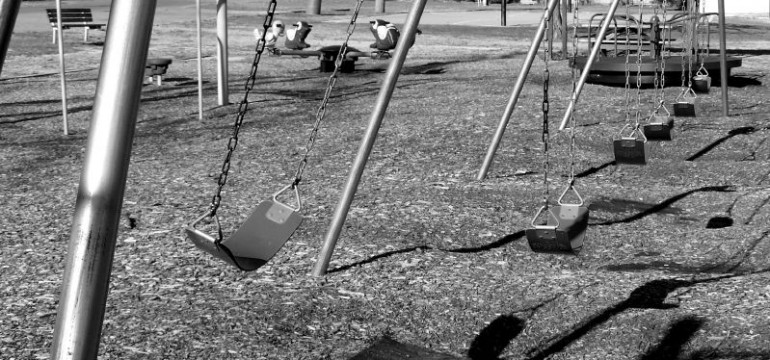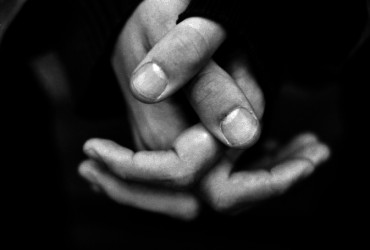Mom fell off the porch when she was pregnant with me. Dad told me this when I was four, and Dad isn’t around anymore to answer my questions, so I can’t ask them. I like to imagine that it was the Fourth of July, and she and Dad were lighting sparklers because she loved him then. She celebrated holidays that she despised because it used to be enough to make him happy. Dad held the lighter, and when the embers touched her hand, she dropped the sparkler. She failed to catch it, and instead, she fell.
In another version, Mom dropped her wedding ring. It was midmorning and she walked outside because she needed oxygen. She’d been making banana pancakes, and Dad left the bacon on the stove top too long because they were dancing. Mom didn’t want to dance, but Dad whispered so softly in her ear that the tabby cat in the windowsill couldn’t manage to hear how he convinced her. She couldn’t refuse, so they skirted around the table like they would’ve at the prom they never attended. They hadn’t smelled the smoke.
The fire alarm began to wail. Mom slipped out the screen door while Dad sprayed his fire extinguisher on barely-there bacon. She walked to the edge of the porch and sat down, letting her bare feet hang free. She’d never been free in twenty-nine years, not since her parents told her to marry my dad because she wouldn’t get another offer, not since my three-year-old brother was diagnosed with leukemia, not since she walked into the wedding reception to hear her mother-in-law tell my dad’s sisters what a mistake he made in choosing her as his bride. She slid the diamond off her finger, disgusted. She’d never liked jewelry, never liked how pregnancy swelled the fingers, never liked this porch with wooden panels that threatened to fall through every time she walked across them. Dad called from inside, and while trying to stand back up, she lost her footing.
* * *
My friend Garrett closed his eyes and tossed his head back as the air rushed past his face. “I can fly,” he said dreamily, extending his legs and straightening his spine as much as his scoliosis would allow.
I glared at him as our chains passed each other, leaning over so far that I almost fell. “I’ll show you what it means to fly.”
I believed that if I jumped from the highest arc of the swing’s ascent, I would fly for a few seconds and gracefully land back on earth. This did not happen.
At that age, first grade, I wanted to be a scientist. Or an astronaut. Some days I wanted to be a scientist-astronaut and float around the International Space Station shaking up test tubes while staring at the stars. The scientific community holds an annual seminar to celebrate why kids as hopeless in Physics as me will never join their ranks.
As soon as I left the sliver of rubber seat that was protecting me from gravity’s reign, I felt queasy. My vision bobbed up and down like I was underwater as I hurtled through the air. The sky was made of grass and the ground was made of cloud. That cloud hurt like an anvil had been dropped on my arm when my humerus suddenly wasn’t so connected to my radius.
Somehow Mom managed to peel me from the Alabama clay and half-drag me by the intact arm to my room, where I fell onto the bed. I hadn’t been crying before because I didn’t want Garrett to see, but now I was wailing.
“Are you okay?”
I sounded like an ambulance. I was not okay.
“I’m going to walk Garrett home.”
I was left to grit my teeth and roll around in the blankets because the pain was worse when I was still. Maybe it wasn’t the stillness, but the aloneness.
Forty minutes later, I was sprawled across the backseat of our air-conditionless jeep in the middle of rush hour. Two hours later, I was x-rayed and fitted for a cast that stopped at my shoulder, complete bulk like the arm of the Michelin man. One summer later, I thought I could fly again. What went up came down on the other arm, and it, too, was broken.
* * *
I’ve had a recurring dream since I was four. In this dream, I am in the back seat of the jeep, lying down with a yellow blanket draped across me. Mom is driving, and it’s just the two of us. I peek out the window and see a vast expanse of green-glass ocean beneath the concrete bridge we’re crossing. The bridge is like an endless highway—I can’t tell where we came from, and I can’t see where we’re going. I lean across the back of Mom’s seat to tell her something, but she isn’t driving anymore. No one is. A loud crack roars from directly beneath me, and the bridge collapses in on itself. The jeep plummets down, and because I’m not wearing a seat belt, I fly upwards. I slam into the windshield.
Glass shatters all around me. Confetti shards scatter through the air and lodge into my skin. I can’t feel the pain.
The jeep plunges into the ocean. I don’t even notice.
There are a million black-lacquered crocodiles crawling over each other, eyes glinting like marbles in the sunlight, tails swinging like swords. They’re coming for me.
* * *
Over the summer, I took an online psychology class. I was most curious about the dreams, because my nightmares were becoming progressively worse—sometimes three in a single night. Wedged between Pavlov’s salivating dogs and Piaget’s intelligent children was a unit called Lifespan Development. I skimmed over the details on fertility, and then I arrived at a section on reflexes in newborn babies. I almost skimmed it too, because I didn’t understand why I was learning about infants when I just wanted to understand the theories of Freud.
If you prick the bottom of a baby’s foot, she’ll move her legs toward her head as a Withdrawal Reflex. If you tap a baby on the top of the head, she’ll close her eyelids to protect herself, which is known as the Blinking Reflex. If the baby hears a startling noise or feels like she is falling, she’ll move her arms up and out, extend her head and legs, and clench her fists. This is called the Moro Reflex, a response to falling or losing hold of one’s mother.
* * *
Mom and I don’t talk anymore. When I am driving, I’ll say that I don’t understand where the people on the side of the road are going when there is nothing but trees and road for miles, or I’ll declare that today is a good day because Billy Joel, U2, and the Beatles have all come on the radio in the last hour. At best, I get a nod.
Do you know who Ringo Starr is? She’ll nod, but there is no sign of recognition in her eyes. You don’t know, do you? And on good days, I’ll get an answer: No.
I am not talking to myself because I am carrying a passenger.
* * *
Because our house was built at the beginning of the 20th century, the walls were so thin that you could hear every move made by the person in the adjacent room. Mom was always crying. After my dad left, she only deserted her bed to drive me to school, but she wouldn’t sleep. Some mornings, she would fall asleep while driving on the highway, her head drooping to the steering wheel, and I would have to shake her until she woke up.
* * *
The day I moved in with my grandparents, my mother walked off. She just started walking down the road and she didn’t come back. When the police found her, they took her to a psychiatric ward. She stayed there for three months. Summer had ended and the leaves were falling in cinnamon shades, candied apple colors, pumpkin hues, and sepia. I was given the option to visit. I didn’t.
The woman who came home was not the woman who brought me into the world.
* * *
We are in the car and I am driving, because Mom doesn’t drive with both hands on the wheel, and that scares me. I don’t know where I’m going. Mom hasn’t told me. I keep the speed limit and try not to stare into the windows of too many vehicles at red lights—so many individual worlds splitting off onto separate paths that may lead to discoveries, dead ends, becoming lost, loss. I am not sure which path we are taking.
I flip a switch on the steering wheel, and music replaces the car lot commercial. I know the song, and I start to sing along because Mom isn’t listening.
This is Pearl Jam, Mom. It’s called “Daughter.”
She’s staring out the window, maybe finding shapes of swing sets in the clouds, maybe thinking of my dad, maybe trying to remember a dream.
“She holds the hand that holds her down,” I sing as the guitar solo weaves its own language, a euphony rising and falling while the drums hammer in the background.
2014, 1st Place Creative Nonfiction Winner



